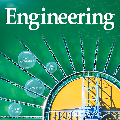Structural topology optimization, which aims to find the optimal physical structure that maximizes mechanical performance, is vital in engineering design applications in aerospace, mechanical, and civil engineering. Generative adversarial networks (GANs) have recently emerged as a popular alternative to traditional iterative topology optimization methods. However, these models are often difficult to train, have limited generalizability, and due to their goal of mimicking optimal structures, neglect manufacturability and performance objectives like mechanical compliance. We propose TopoDiff - a conditional diffusion-model-based architecture to perform performance-aware and manufacturability-aware topology optimization that overcomes these issues. Our model introduces a surrogate model-based guidance strategy that actively favors structures with low compliance and good manufacturability. Our method significantly outperforms a state-of-art conditional GAN by reducing the average error on physical performance by a factor of eight and by producing eleven times fewer infeasible samples. By introducing diffusion models to topology optimization, we show that conditional diffusion models have the ability to outperform GANs in engineering design synthesis applications too. Our work also suggests a general framework for engineering optimization problems using diffusion models and external performance with constraint-aware guidance. We publicly share the data, code, and trained models here: https://decode.mit.edu/projects/topodiff/.
翻译:结构性结构结构优化旨在寻找最佳物理结构,最大限度地提高机械性能,在航空航天、机械和土木工程工程工程工程设计应用中至关重要。创形对抗网络(GANs)最近成为传统迭代地形优化方法的流行替代物。然而,这些模型往往难以培训,具有有限的通用性,并且由于它们的目标是模仿最佳结构、忽视制造力和机械合规等性能目标。我们建议TopoDiff -- -- 一个有条件的推广模型基础架构,以进行性能-觉悟和造能-敏化地形优化,以克服这些问题。我们的模型引入了一种基于代孕模型的指导战略,积极支持低合规性和良好的操纵力结构。我们的方法由于将物理性能的平均错误降低8倍于机械合规率,并且通过生成11倍于不可行的样本,因此大大超过条件性GAN。我们的工作模式引入了在工程设计合成应用中优于GANs的模型。我们的工作还提出了一种以替代法的模型。我们所培训的外部性能框架。我们在这里使用了一种约束性能模型,我们的工作还提出了一种通用的模型。



